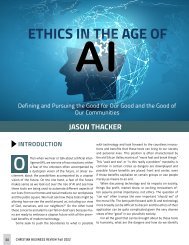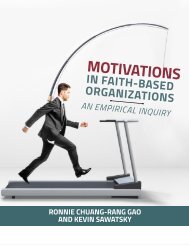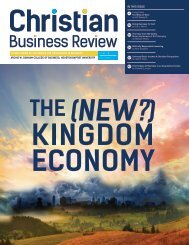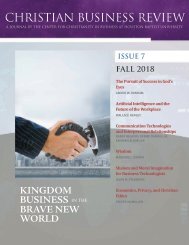Christian Business Review 2022: Pressing On Toward God's Goal
Create successful ePaper yourself
Turn your PDF publications into a flip-book with our unique Google optimized e-Paper software.
MOTIVATIONS IN FAITH-BASED ORGANIZATIONS<br />
CBR PEER-REVIEWED ARTICLES<br />
FIGURE 1<br />
CONCEPTUAL MODEL WITH HYPOTHESIZED ROUTES<br />
PERSONAL FAITH<br />
PERCEIVED FIT<br />
TL<br />
H2: a 1<br />
b a 1<br />
H4: a 2<br />
b a 2<br />
H6: a 3<br />
b a 3<br />
H5<br />
H3<br />
H1<br />
MOTIVATION<br />
b<br />
JOB SATISFACTION<br />
among employees. Furthermore, leaders high in individualized<br />
consideration care about the specific needs of employees<br />
and listen to their concerns. All these factors should increase<br />
belief in the ability to complete assigned tasks. Thus, the expectancy<br />
dimension will be high. Second, leaders high in idealized<br />
influence are able to make employees trust and identify<br />
with them, while leaders high in individualized consideration<br />
care about their employees on an individual basis. These factors<br />
should make employees believe that leaders will honor<br />
the organization’s reward policies. Thus, the instrumentality<br />
level will be high. Third, leaders with inspirational motivation<br />
will articulate an appealing vision. In FBOs, this vision is more<br />
likely to be related to employees’ faith. As a result, employees<br />
will likely put organizational vision and benefits ahead of<br />
their own. These factors should lead employees to value the<br />
rewards given to them, whether they are extrinsic rewards<br />
(e.g., financial incentives) or intrinsic rewards (e.g., recognition).<br />
Thus, the valence level will be high. High levels of<br />
expectancy, instrumentality, and valence indicate more motivated<br />
employees who, in turn, will be more satisfied with<br />
their jobs. Thus:<br />
Hypothesis 6<br />
In FBOs, motivation mediates the relationship between<br />
transformational leadership and job satisfaction.<br />
That is, transformational leadership is positively<br />
related to motivation, and motivation is positively<br />
related to job satisfaction.<br />
Fig. 1 presents our conceptual model based on the six hypotheses.<br />
CHRISTIAN BUSINESS REVIEW Fall <strong>2022</strong> 272














